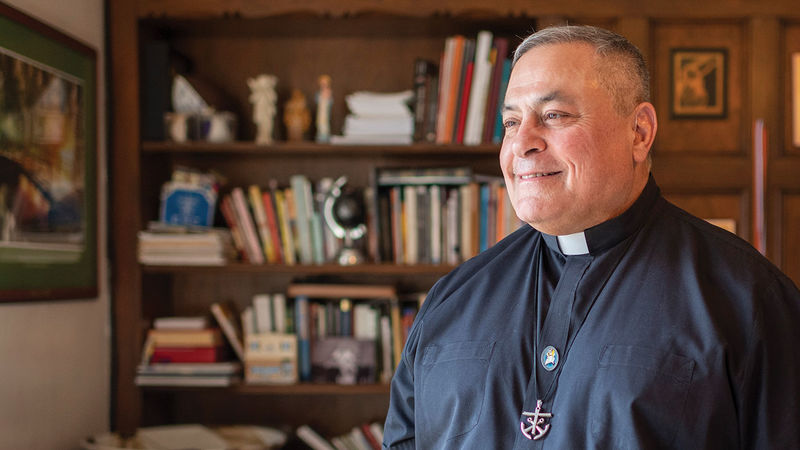Day 1
When I walked into the Humanitarian Respite Center in McAllen, Texas, people were everywhere — kids playing and running around, mothers nursing babies, teenagers chatting with one another, men talking and visiting.
I had arranged to meet Sister Norma Pimentel, M.J., there. The executive director of the local Catholic Charities office, Sister Norma received Notre Dame’s Laetare Medal last year for her devoted work with immigrants, refugees and the poor in the Rio Grande Valley. In 2014, she opened the Humanitarian Respite Center to take care of people who had been jailed for crossing the border while seeking asylum in the United States, and who had then been released and dropped off at the bus station. They had no money, no food, no change of clothing and no way to reach relatives who could purchase them a bus ticket, enabling them to stay in the States. They had not bathed in days; they had nothing.
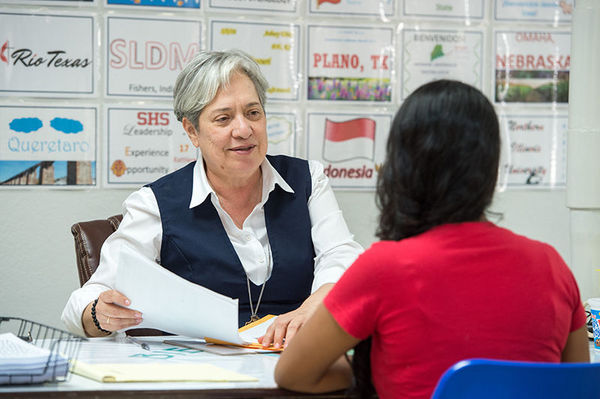 Photography by Barbara Johnston
Photography by Barbara Johnston
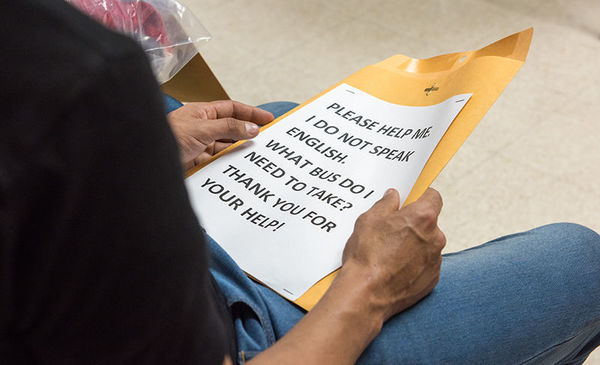
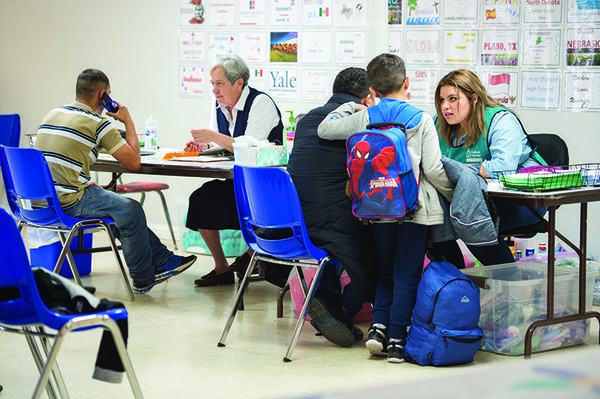
I had volunteered to help at the center during the Christmas holidays and arranged through the local bishop to stay at the Basilica and National Shrine of Our Lady of San Juan del Valle, where I would assist with Masses and confessions.
Before heading there today, December 29, I thought Sister Norma and I would meet in her office and talk about what I would do and set a schedule that would allow me to assist at the basilica. You can imagine my surprise when I realized Sister Norma’s office was wherever she happened to be standing at the moment. She described the place as “holy chaos.”
A dozen volunteers were making sandwiches, cleaning floors, serving lunch, sorting clothing, giving out aspirin, stacking mats that people had slept on the night before, hauling out the trash, lining up people to get on a bus to go someplace where a family member could welcome them. I learned that the day before ICE had dropped off 530 people.
Every afternoon ICE, U.S. Immigration and Customs Enforcement, brings anywhere from 80 to 550 people to Sister Norma’s respite center. Among the many fascinating things about Sister Norma is that she works with ICE and the U.S. Border Patrol. While they have different agendas and different ways of seeing the world, they do try to work together.
I had a brief orientation, received a Catholic Charities Disaster Relief T-shirt and was told what time to come back in the morning. From there I drove the four miles to the basilica in San Juan, Texas. It’s an enormous operation. It’s like Vatican City in the Rio Grande Valley.
The basilica is really beautiful. It is the second-most visited basilica in the U.S. Only the Basilica of the National Shrine of the Immaculate Conception in Washington, D.C., has more visitors. But no tourists come here. More than 20,000 pilgrims come each week, and within two minutes of entering the basilica, the thing you notice is that it belongs to the people. Many basilicas seem more like museums than places of prayer, belonging more to the staff than to the people.
I heard confessions from 3 to 5:15 p.m. and said Mass at 5:30 p.m. Four priests were hearing confessions, and it looked like half the pilgrims were in line! I am always grateful for the opportunity to hear confessions and to celebrate the Eucharist. Being in this basilica, celebrating Mass, hearing confessions was so refreshing because it is of the people.
Day 2
On Sunday, December 30, I said the 7 a.m. Mass then drove to the center to work. When you sign up to work with immigrants and refugees, the first thought is that you are going to do incredible things to serve them — to help with their papers, talk with them about God, and who knows what other lofty ideas.
For the first hour I made ham and cheese sandwiches. Totally boring, but so necessary. I made sandwiches with another volunteer and with Alberto and Juanito, a father and son from Guatemala. Their first language is not Spanish. It is Q’eqchi’. After some time of making sandwiches, we began talking. The son spoke much better Spanish than his father.
They left Guatemala on November 23 and began walking to the U.S. in search of work. They walked through Mexico, stopping here and there, sleeping under the stars or wherever people would take them in. They did odd jobs to make a little money to buy food. They arrived at the U.S.-Mexico border on December 23. They swam across the Rio Grande late at night and stayed for three nights, trying to hide outdoors. Totally wet clothes, sleeping outside for three nights, no food to eat. Then Border Patrol found them, arrested them and sent them to jail. They were released on December 26 to Sister Norma’s respite center.
The dad had left his wife and three other children in Guatemala. They intend to stay for a few years, send money back to their family, then return to Guatemala. They had not had any contact with their family since they began their journey, so I lent them my cell phone. They called a family member in Guatemala to share the news that they had arrived. I was so grateful to be able to lend them my cell phone to make that call. The father tried to call his wife, but received no answer. He said to me, Es domingo. Estará en la iglesia. “It’s Sunday. She must be at Mass.” They didn’t yet know I am a priest. So I don’t think he was trying to impress me. I had to turn away because of the tears welling up in my eyes.
I later learned that staff and volunteers are strictly forbidden to lend their cell phones to people. Since then I have received a bunch of WhatsApp messages where the caller ID reads “Guatemala.” Others have asked to use my phone to make calls. I have never been one to follow the rules for the sake of following the rules. But I do understand why this policy exists. That being said, I’m so grateful to be in the Church with the current Vicar of Christ, Pope Francis. He understands and respects the rules, but there’s always more to a situation than the rules. I love Pope Francis for many reasons. One is that I feel like finally someone has my back — the Pope!
After my first hour on ham-and-cheese-sandwich detail, I was sent to clean the bathrooms. You can begin to imagine how quickly trash accumulates in the bathrooms when over 500 people are using eight toilets. I emptied trash and put in new liners, emptied trash and put in new liners, emptied trash and put in new liners. However, I almost never made it to the trash bins. As I walked by people with the trash, inevitably someone would say, Yo lo hago. “I’ll do that.” The people are ready to help and very grateful.
The administration has referred to the people in this caravan as criminals, drug traffickers and rapists. Nothing could be further from the truth. Nothing.
My final job of the day was washing, drying and folding towels. When over 500 people spend the night you have lots of towels to wash and dry and fold. I found Gaspar and asked him to help me. In the folding of towels, I learned that his wife is already in California. He traveled from Guatemala with their three children, all under the age of 12. It took them three months to walk from their village to the U.S.-Mexico border. They crossed the river at night, were arrested by Border Patrol, put in jail and released the next day, then brought to Sister Norma’s respite center. Gaspar and I folded towels until lunchtime.
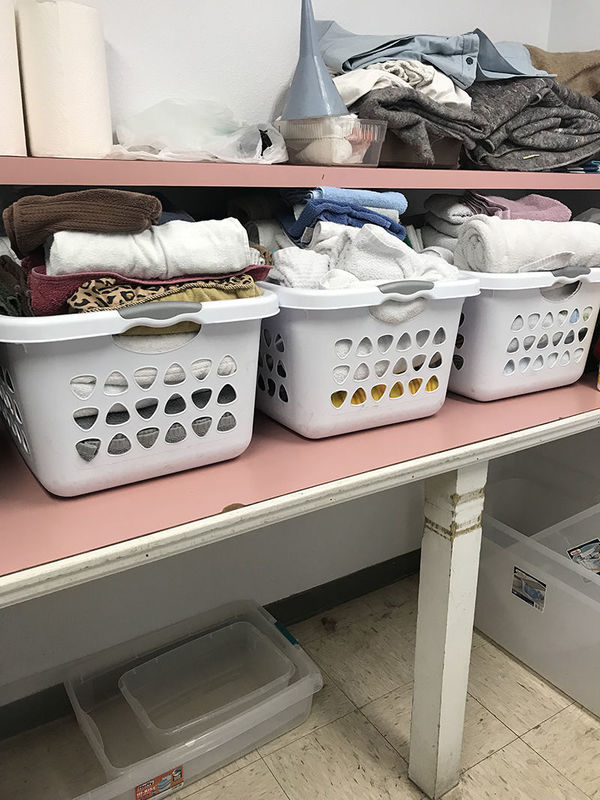
After one day of working at the center, I realized that my left-brain mind and Type A personality could make things a bit more efficient. But I would be creating a system in which people would begin to feel like clients or numbers instead of like human beings. Efficiency would certainly not be worth making people feel like numbers rather than children of God. In an age when even the Church has succumbed to CWMA (Counts-Weights-Measures Addiction), it is so healthy to see a place where people have not been reduced to charts and graphs and data analysis. They are treated and respected as human beings.
I returned to the basilica for confessions and Mass. Today the other half of the pilgrims must have been in line. The sacrament of confession may be the Church’s best-kept secret. People pour out their hearts, cry, sob, tell their stories, confess their sins, then seek mercy and forgiveness, pardon and understanding. They just want someone to hear their story, to listen to their sorrow.
Today was the Feast of the Holy Family. At each of the three Masses I celebrated I heard these words in the Gospel: “Thinking that [Jesus] was in the caravan, [Joseph and Mary] journeyed for a day and looked for him among their relatives and acquaintances, but not finding him, they returned to Jerusalem to look for him.”
How could I hear the word “caravan” and not think of the caravan of immigrants who have recently arrived at the U.S.-Mexico border from Central America? The administration has referred to the people in this caravan as criminals, drug traffickers and rapists. Nothing could be further from the truth. Nothing. Jesus is certainly present in every person in this caravan from Central America. May God have mercy on our country and forgive us for failing immigrants and refugees.
Day 3
New Year’s Eve. In the morning I went directly to the laundry and began washing, drying and folding towels — and lots of them — from the morning showers.
From there I was sent to the men’s clothing room to sort clothing by size and to give it to the men and boys who needed it. As each person entered, I asked his size and then gave him what he needed — a pair of pants, a shirt, underwear and socks, maybe shoes. With so many people coming each day, I completely understand and accept how this is done. Yet it made me sad that each man could not pick out what he wanted. It reminded me how the poor are always stripped of their choices.
Alberto and Juanito helped me again today. I asked them why they were still at the center, since most people stay one or two nights at the most. They explained that the family member they called did not have the money to send them tickets to Florida. I checked with the bus company and learned that two bus tickets to Florida would cost $384. I decided to buy their tickets. Nothing virtuous on my part. I thought, I spend more money than that in a year buying one energy drink a day. I felt ashamed of how I, with a vow of poverty, waste money. They will leave the center on Tuesday afternoon.
Each day at different times the line forms for those who will leave the center to get on a bus to meet up with family members in the U.S. First they are given a good, hot lunch and then a bag with food for the journey. Each person holds a manila envelope that contains their papers and bus tickets and any other important documents. The manila envelope reads, Please help me. I do not speak English. Can you please help me to find my bus? Traveling from McAllen inevitably means changing buses a few times.
I’m not sure why, but just looking at those words on the envelope made me cry. Here are poor immigrant people with not a cent in their pockets, getting on a bus in a foreign country to go to a city where they have never been before. They don’t even have the money to buy a bottle of water. They don’t have a change of clothing. They don’t speak English. Nothing. My heart breaks for them. And they are being painted as criminals and rapists and drug traffickers. Nothing could be further from the truth.
Each person I spoke with made many references to their gratitude to God for getting them where they were. I am not wearing my Roman collar, yet they say, “Thank you — and thank God for these pants.” And, “I slept outside night after night with my children, but I knew that God was with me.” Or, “It’s only because of Him that I made it this far.” Try as I might I have not yet found any drug traffickers, rapists, criminals or otherwise bad people. I’ve only found people whose lives of faith inspire me. I’ll keep looking for the criminals tomorrow.
Day 4
Today I asked Miguel and Eugenio to help me wash, dry and fold towels, which they readily did. Both men brought two children with them from Guatemala and left other children with their wives in Guatemala. I asked Eugenio how his 2-year-old daughter, Daisy, was able to walk such a distance. He looked at me like I was nuts and said, “I put her on my shoulders and I carried her all the way.” I asked both men why they didn’t leave their children in Guatemala. They explained that there is no work, which means there is nothing to eat. So they divided the kids.
I ate lunch with several women, two of whom had just had babies. One, Mateo, was three days old and the other, Jodil, was two days old. Both women crossed the border when they were very late in their pregnancy. Both delivered their babies in a hospital in McAllen and then came to the respite center. Those two babies are adorable — and they’re U.S. citizens!
Again today I was not able to find any criminals or rapists or drug addicts among the many people at the center. Maybe tomorrow. I’ll keep looking.
Day 5
Another day of grace at the center, where I washed, dried and folded towels. Today Carlos and his son, Mauricio, and Emilio and his son, José, helped me. Emilio is from El Salvador and Carlos is from Guatemala.
They left their homes because of violence, a violence that is destroying their countries and deters companies from investing there — which translates to no jobs, no money, no food and the inability to provide for a family.
Emilio and Carlos must have said “thank God” 10 times during our conversation. We got across the river, gracias a Dios. Here we are in this beautiful place, gracias a Dios. They have given us good food and clothing, gracias a Dios. We hope to be able to help our families back home, gracias a Dios. It’s so clear that the less we have the more we recognize and are aware of our dependence on God. These people have no sense of entitlement. None. We have so much to learn from the poor.
At one point I was on my cell phone trying to upgrade a seat on my flight home. So often I am brought face to face with the inequalities of life. After working at the center, I got in my nice rental car and drove away.
Before I left, Border Patrol dropped off more than 400 people. I’ve never seen anything like it — people pouring off buses with no idea where they are or what’s next. They are all coming from jail. I was wrong about how long they spend in jail. Some spend one night. Others spend up to a week in jail while the government checks out their backgrounds and discerns whether the people who will “receive” them in the U.S. are legitimate.
It is becoming more and more difficult for me to listen to the lies told by the administration about protecting our borders from criminals and rapists and drug dealers. When a person with a criminal record crosses and Border Patrol does the background check, that person is sent immediately back across the border into Mexico. If the administration would come to a place like Sister Norma’s respite center for one day, I would like to think that they would see things very differently. May God have mercy on us.
After confessions and Mass at the basilica, I went back to the center because I wanted to be sure there would be clean towels. With 400 people arriving and showering and cleaning up, well, that’s a lot of towels.
I end as I began. Another day of grace at the center. I am reminded of that wonderful Amish saying, “When you have plenty, you build longer tables, not higher walls.” The United States would do well to build longer tables. We can certainly afford to do so.
Day 6
More towels! I am becoming an expert at washing, drying and folding towels. Today Eduardo helped me. We had a long conversation about his trip from Honduras through Mexico with Timoteo, his 2-year-old son. It made me very sad. He told many stories of how he was mistreated by so many people as he journeyed toward the U.S. border.
The whole world has a pecking order. Mexicans feel superior to people in Central American countries, and Americans feel superior, too. How can human beings be so cruel to one another? I just don’t understand it. I love Mexican people, but Eduardo’s stories made me sad and angry. When will human beings stop treating other human beings as less than human?
Kids are everywhere at the center, between 50 and 80 preschool kids on any given day. They all ride big-wheel trucks and run into each other (and me!) as they happily go around unaware of their precarious future. They never stray far from their parents. And the parents keep their eyes on their children. Each person who has helped me in the laundry has brought his son or daughter with him.
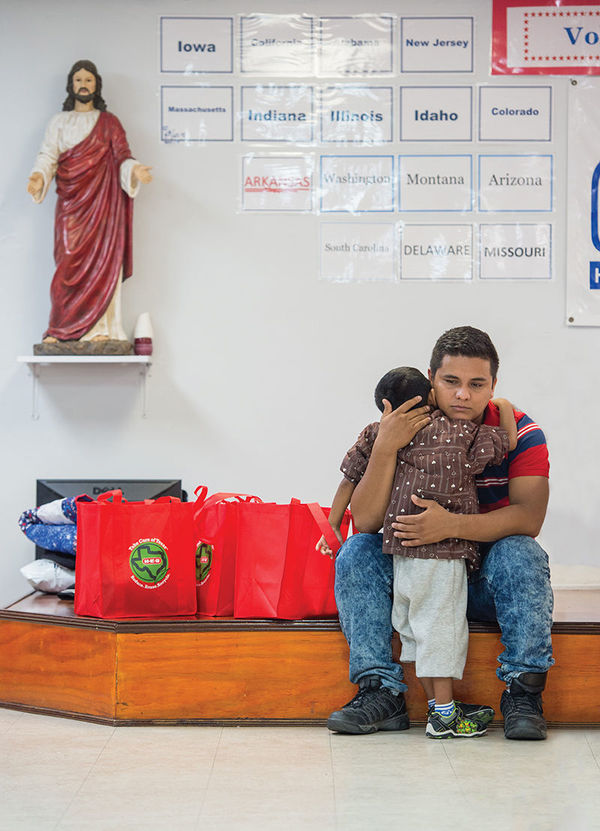 Photo by Barbara Johnston
Photo by Barbara Johnston
I watch those kids and, for the most part, they look like kids and sound like kids and play like kids everywhere around the world. They play hard. They take naps. They run around everywhere. I lament that they have no privilege in life and a sad future.
Today I noticed something I hadn’t before. I had to take a basket of clean towels into the men’s shower. I noticed two men with ankle bracelets that track where they are. Then I looked closely and saw that they all have ankle bracelets. ICE tracks them to make certain they know where they are. I guess I understand this, but it’s still so sad.
I know immigration is a complicated issue, but this is about people and families. As Pope Francis has written, “Migrants and refugees are not pawns on the chessboard of humanity. They are children, women and men who leave or who are forced to leave their homes for various reasons. . . . A change of attitude toward migrants and refugees is needed on the part of everyone, moving away from attitudes of defensiveness and fear, indifference and marginalization . . . toward attitudes based on a culture of encounter, the only culture capable of building a better, more just and fraternal world.” I wish we could keep that front and center.
Tonight I think about a big difference between the government and the Church. The face of the government is an office. The face of the Church is a person. This is so clear at Sister Norma’s respite center. I sometimes fear, as I mentioned, that the pastoral face of the Church is being lost with the inclination toward numbers and graphs and data analysis and outcomes. Places like this remind us that it need not be the case.
Day 7
Today I celebrated the 6:30 a.m. Mass at the basilica. It always feels strange to say, “Blessed are those called to the supper of the Lamb” at 6:30 a.m. But it would really be awkward to say, “Blessed are those who are called to the breakfast of the Lamb.”
At the center I again went directly to the laundry to wash, dry and fold towels. Isaias helped me. He is a 14-year-old boy from Honduras. He told me that once he and his dad get to New York he hopes to enroll in school. He needs a backpack and asked me how to say mochila in English. I wonder what will happen once he and his father get to New York.
I was sad when I left the center today. I am certain I will be back, God willing. I have a lot more to learn: from the poor who truly trust in God, and from the Humanitarian Respite Center, which keeps alive the pastoral face of the Church. It has not succumbed to metrics, has not fallen into the trap of measuring the value of our efforts by the standards of functionalism and efficiency that rule the business world. Rather its staff and volunteers seek to live the joy of the Gospel and practice the culture of encounter with everyone there.
This has been a most incredible week. I cannot think of a better way to have ended 2018 and to have begun 2019. Immigrants and immigration are not going to go away. The Church needs to do so much more to respond. How the Church responds may well define the Church for years to come.
Father Joe Corpora works in the Alliance for Catholic Education, lives in Dillon Hall and is one of 700 priests whom Pope Francis appointed in 2016 to serve as Missionaries of Mercy. He has written two books of reflections on this experience, The Relentless Mercy of God and Being Mercy: The Path to Being Fully Alive, both published by Corby Books.
